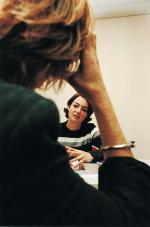Lifting the mask on postnatal depression
 Clinical Nursing Clinical Nursing
Media portrayals of modern mothers regularly show them as "super-mums": women who shortly after giving birth can juggle a return to their career, managing a household and bringing up a perfect child while looking gorgeous, rested and happy. But research by an University of Adelaide PhD student has found the reality of motherhood is much different for many women, with up to as many as one in five suffering from postnatal depression. For her PhD with the Department of Clinical Nursing, Victoria Williamson looked at women's experiences of postnatal depression and the effectiveness of health professional diagnosis and intervention.
She found that sufferers frequently hid the truth behind a serene and ever-smiling "mask"' and the pretence that motherhood was as perfect as a television commercial. "The mask is worn because of cultural ideologies, media-created dogma concerning the need to appear perfect in the role of mother, and the cultural stigma attached to postnatal depression or any kind of mental illness in our society,"
she said. "While normal motherhood does have its wonderful moments, women are given the impression that they always have to be this serene and smiling goddess no matter how tired and stressed they are, but that's just not reality. "It's a culture and media-created image of perfection in motherhood and women are brainwashed into believing it's the correct way to behave. "The mask has been around since the 1950s, but back then raising children and looking after home and hearth properly was the norm, respected and enough for one person to do. You weren't expected to also be successful in the workforce, plus slender, fashionably dressed and well made up at all times. "Wearing the mask is also a symptom of postnatal depression because the women concerned are anxious, have low self-esteem and want to make a good impression on others - they are more likely to buy into notions that they must be perfect or appear to be or they're not doing it right.
"This is a problem for both the postnatal depression sufferer and the health professional because diagnosis gets delayed and so does treatment and people can consequently suffer for years. "The baby blues are hormonal and last for three to five days after the birth of the baby, but four to six weeks after the birth, if a woman still suffers a persistent low mood and sadness, that's postnatal depression." Ms Williamson said women could suffer mild postnatal depression after their first child and the illness could get progressively worse as each baby came along. "When I was involved in counselling, I met women 10-15 years later who had never received any treatment. In extreme cases they can become extremely depressed and it was enough to put some of them off having another child altogether," she said. "The mask usually comes off with diagnosis and health professionals can often pick up on the discrepancies between a woman's body language or red eyes from crying and what she is telling them. "Sensitive and aware health professionals whose intuition tells them that something is not quite right with a new mother who otherwise 'presents well', need to ask careful questions to see if they are being confronted with a mask. "Health professionals need not be afraid to screen women for postnatal depression and to remind clients that it is not a shameful condition and help is available for it." However, Ms Williamson said, the sheer lack of resources and crisis support workers meant women were very lucky to get treatment at all. "Helen Mayo House, the postnatal depression unit at the Women's and Children's Hospital is excellent, but there needs to be more of it," she said. "There also needs to be more support for women in the community raising children. I'm dismayed at the lack of help for single mothers and plans to push them out into the workforce, and that we live in a society that is focused on work and devalues motherhood and child-rearing. "Why is it that a woman when she's pregnant is made a huge fuss of, but with a baby on her hip she's just expected to cope with getting in and out of shops and on and off buses - it needs to be okay for women to ask for and receive help." Education and raising awareness of the illness are critical if the illness is to be prevented and the mask dissolved, she said. "Make sure it is spoken about in ante-natal classes and school students should also be taught that it's okay for mum to be worn out.
"You see mothers struggling with young children every day - what's wrong with asking a woman with a baby how she's going and offering her a hand? She may not accept it, but she will be glad you asked." Story by Lisa Toole
|






